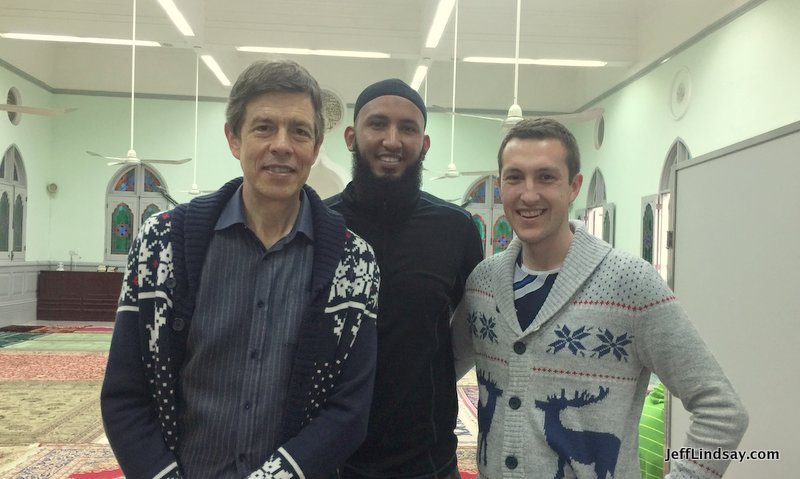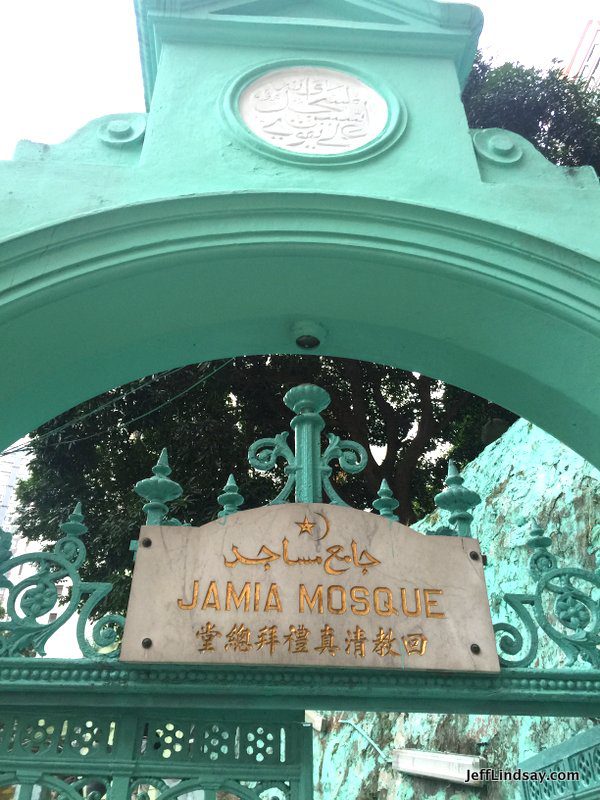On Christmas day, I visited the Jamia Mosque in Hong Kong, and it was a highlight of our day. It was my youngest son’s idea. It began with his desire to try the world’s longest outdoor escalator system in the Mid-Levels section of Hong Kong, where many consecutive escalators allow you to scale a steep section of town that is loaded with interesting restaurants and shops. Along the way up, he saw a mosque and suggested we visit. All of us were interested and hoped to learn a little more about an important world faith, so off we went.
It was a Friday and an open-house day. My wife wasn’t sure if she would be able to come in, but we were warmly greeted by a tall, friendly man who encouraged all of us to enter and have a look. I told him we’d like to learn a little more about his faith. He was so happy to share! Our new friend, Othman, comes from Yemen, and was passionate and eloquent in sharing his beliefs. I thought to myself that many of us could learn from him and his kind, enthusiastic manner in sharing his faith.
I was both pleased but saddened when he told us how excited he was about our visit, for in his years there at the mosque, he’s never had people just come up and say “We’d like to learn more, please.” He said Christians sometimes come to say critical things, like “Why did you people blow up our buildings in New York?” or “Why did you kill those people in France?” While he speaks Chinese, Chinese tourists don’t want to talk and just come in to take photos and then rush away. So he was delighted to have curious people actually listening and asking questions. I was glad we did, but sad that we seemed to be the first. Sigh.
Since he was from Yemen, I also took a moment to ask about the Nihm Tribe in Yemen, the ancient tribe whose tribal area has been labeled as “Nehem” or “Nehhm” on some old maps. When I said “Nihm,” I pronounced it incorrectly. Othman helped us with the correct pronunciation. I would transliterate it as something closer to “Nehem,” with a hard, guttural “h”. He confirmed that the tribe is ancient, prominent, and important in Yemeni history–something Book of Mormon students may already know since it relates to Nahom in the Book of Mormon.
Take time to visit your local mosque and say hello from Jeff and Othman!












What an uplifting exchange!
I learned about Yemen this past summer with my family, and they have great food there. If he gave you a restaurant recommendation, definitely heed it.
Great stuff, Jeff, thanks for sharing.
Not for nothing has Joseph Smith been called 'the American Mohammed.'
Both proclaimed themselves prophets, started a violent theocracy, condemned wine, and (a sure sign of a man-made religion) claimed that God wanted them to have lots of wives. Alas, poor Mohammed had only a dozen, while Joseph collected 40.
Yet there are good Muslims and there are good Mormons. Goes to show you there's got to be a spark of something good in the human soul.
This comment has been removed by the author.
Tony V. –
Actually, Mohammed tightened the marriage practices of his time. Though "poor Mohammed" was indeed born poor, much like the Apostle Paul he married an older, rich woman that gave he the means to become rich and powerful. After his wife died and now in a position to arrange political alliances, he did indeed openly marry multiple wives, the super majority of whom were widows before marrying him, but nothing to the scale of he could have according to the time period and his contemporaries. The wealthy men of his time had large harems, which Mohammed suggested should be restricted to a maximum of four. After making the suggestion, he himself ceased to take on more wives.
Joseph Smith on the other hand radically modified the marriage practices of his time in quite the opposite direction. Two very different stories. Mohammed (whether direct by divinity or not) restricted the polygynist practice of his place and time. Joseph Smith not only re-introduced something that had been attempted since before "the times of King James", he did so on a large and questionable scale that consensus says included polyandry, insisting the numerous and secret "marriages" were divinely mandated.
Tony V. – David Koresh is a much stronger analogy for Joseph Smith. So strong in fact, Mormanity has been incapable of offering a retort other than ad hominem attack.